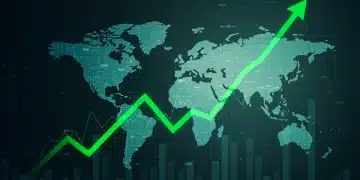Geopolitical tensions and their effect on global markets

Geopolitical tensions significantly influence global markets by causing volatility in stock prices, altering trade relations, and prompting investors to seek safe-haven assets, ultimately affecting economic stability and business strategies.
Geopolitical tensions and their effect on global markets contribute to a complex web of challenges and opportunities. As global dynamics shift, how do these tensions impact financial landscapes and trade? Let’s dive deeper.
Understanding geopolitical tensions
Understanding geopolitical tensions is essential in today’s global landscape. These tensions arise from a variety of factors, including historical conflicts, economic competition, and cultural differences. By comprehending these dynamics, we can better anticipate their impact on various markets.
When examining geopolitical tensions, it’s important to consider their sources. They often stem from:
Major Factors Contributing to Geopolitical Tensions
These factors can create instability, which influences investor confidence. For instance, when tensions escalate, stock markets can react negatively. Investors tend to seek safe havens, which can drive down stock prices in affected countries.
Additionally, governments might impose sanctions or trade barriers in response to geopolitical events. This leads to further economic repercussions that can be felt worldwide. The interconnected nature of global markets means that unrest in one region often affects others.
The Role of Global Organizations
International organizations play a vital role in mediating tensions. They work towards diplomatic resolutions to avoid escalation. Examples include:
By understanding these interconnections, businesses can navigate the complexities of global markets more effectively. Awareness of geopolitical tensions can inform strategic decisions, allowing companies to mitigate risks and seize opportunities.
Geopolitical tensions shape not just immediate reactions but also long-term trends. Analyzing historical patterns can uncover insights into future market movements, making it crucial for investors and businesses alike.
Key global markets affected
Understanding which key global markets are affected by geopolitical tensions is crucial for investors and businesses. These markets often respond dramatically to international events, leading to shifts in supply and demand, pricing, and competition.
Some markets are more sensitive to these tensions than others. For example, the energy sector frequently experiences volatility during times of conflict. Cuts in oil supply due to tensions can skyrocket prices, impacting consumers and businesses globally.
Major Global Markets Impacted
These sectors highlight just how interconnected our global economy is. When geopolitical tensions arise, the impacts ripple through various industries. For instance, when a country imposes tariffs or sanctions, it can lead to increased costs for goods. In turn, businesses may need to raise prices, affecting consumers.
Another market significantly influenced by geopolitical tensions is the finance sector. Uncertainty often drives investors toward safer assets like government bonds. This shift can lead to fluctuating interest rates, impacting borrowing and lending.
Additionally, the tourism and travel industry can undergo drastic changes. Tensions can deter travel, causing drops in tourism revenue, which in turn affects local economies.
Understanding these key global markets affected by geopolitical tensions provides a clearer picture of potential risks and opportunities. Awareness allows stakeholders to make informed decisions in our ever-evolving economic landscape.
Impact on trade relations

The impact of geopolitical tensions on trade relations is significant and can shift quickly. When countries face conflicts or disagreements, their trade relationships can become strained. This affects not just the nations involved but also global markets.
One immediate effect of rising tensions is the imposition of tariffs and trade barriers. Countries may respond to perceived threats by raising costs on imported goods. This makes products more expensive for consumers and can harm businesses that rely on imported materials.
Key Ways Geopolitical Tensions Affect Trade
For example, tensions between two nations can lead to a withdrawal from trade agreements that once promoted cooperation. This withdrawal disrupts the flow of goods and services, resulting in uncertainty for businesses and consumers alike. In some cases, companies may seek alternative markets, which can lead to new partnerships or opportunities.
Another significant aspect is how geopolitical tensions can lead to sanctions. When one country imposes sanctions on another, it can severely limit trade. This restriction not only impacts the sanctioned country’s economy but also affects countries that trade with them. Those nations may face repercussions, such as reduced market access or increased compliance costs.
Moreover, the uncertainty caused by geopolitical tensions makes long-term planning difficult. Businesses may hesitate to invest in certain regions, leading to slower economic growth. Companies must constantly monitor the political climate, as shifts in government or policy can dramatically alter their operational landscape.
The impact on trade relations highlights the interconnectedness of our global economy. Every action taken in response to geopolitical tensions resonates through various markets, influencing economic stability and growth.
Investment trends during geopolitical crises
Investment trends during geopolitical crises often reflect heightened uncertainty and risk aversion. Investors typically respond to these crises by adjusting their portfolios to safeguard assets. Understanding these trends helps individuals and businesses navigate turbulent markets.
When geopolitical tensions rise, investors usually flock to safe-haven assets. These assets tend to hold their value better during crises and include:
Safe-Haven Assets
As uncertainty impacts broader markets, we often see stock prices volatility. Major indices may drop sharply, prompting investors to seek stability. In this environment, sectors like technology and finance can experience significant fluctuations.
Furthermore, foreign direct investments (FDIs) often decline during geopolitical crises. Companies may hesitate to enter or expand in regions with high uncertainty. This pullback can lead to slower economic growth in affected areas. Companies must weigh the risks before committing capital, often leading to diminished investment flows.
Shifts in Geographical Focus
Another trend observed is the shift in investment focus. Investors may redirect capital into nations perceived as safer or more politically stable. For example, countries with strong governance and low geopolitical risks can attract investments even during global tensions. This shift can result in:
Ultimately, the patterns of investment during these crises underscore the importance of adaptability. Investors must continuously assess their strategies as geopolitical situations evolve. The ability to pivot effectively can mean the difference between safeguarding assets and facing substantial losses.
Investment trends during geopolitical crises offer critical insights into market behavior, highlighting the interconnectedness of economics and global stability.
Strategies for businesses
In today’s volatile environment marked by geopolitical tensions, businesses must adopt effective strategies to thrive. These strategies not only help mitigate risk but also enable companies to seize opportunities that may arise amid uncertainty.
One critical approach is to diversify supply chains. By reducing reliance on a single supplier or region, companies can navigate disruptions more effectively. This flexibility ensures that businesses can maintain operations even when geopolitical events impact one area.
Key Strategies for Businesses
Another important strategy is to enhance risk management practices. Companies should conduct regular assessments of potential geopolitical risks and create contingency plans. These plans can outline steps to take during crises, helping to ensure swift and effective responses.
Moreover, staying informed about international developments is vital. Businesses should monitor news and analysis related to geopolitical events. This information allows them to adjust their strategies proactively rather than reactively.
Utilizing Technology for Adaptation
Incorporating technology into operations can also provide a competitive edge. Data analytics and artificial intelligence can help businesses forecast trends and make informed decisions quickly. Technology can streamline processes, reduce costs, and improve overall efficiency.
Furthermore, engaging in continuous training for employees is essential. A well-informed workforce can contribute to more agile decision-making during times of crisis. By empowering teams with knowledge, businesses can become more resilient.
Strategies for businesses during geopolitical tensions involve a combination of flexibility, preparedness, and technological integration. By embracing these strategies, companies can navigate challenges and emerge stronger in the global marketplace.
Emerging opportunities amidst uncertainties

Emerging opportunities amidst uncertainties often arise when geopolitical tensions create shifts in global dynamics. While challenges can seem daunting, they can also open doors to new markets and innovative solutions.
Investors and businesses that can identify these opportunities stand to benefit greatly. For instance, companies may find openings in regions that are less affected by conflicts. By expanding into these areas, they can tap into fresh consumer bases. Moreover, businesses might explore alternative supply chains that are safer and more reliable.
Key Areas of Opportunity
In addition, technological advancements can play a crucial role in navigating uncertainties. Companies that leverage technology to improve supply chain management often find themselves at a competitive advantage. Digital tools can help forecast changes in demand and manage inventory more effectively, allowing businesses to respond swiftly to market fluctuations.
Furthermore, engaging in corporate social responsibility can enhance a company’s reputation in new markets. By contributing positively to local communities, companies can build trust. This trust often leads to stronger relationships and increased customer loyalty over time.
Monitoring Market Changes
Continually monitoring global markets is vital to spotting emerging opportunities. Businesses should invest in market research to understand consumer trends and geopolitical developments. Adapting quickly to these insights can lead to timely and strategic business decisions.
Emerging opportunities amidst uncertainties highlight the importance of resilience and adaptability. Companies that remain alert and proactive can navigate tough times and emerge stronger than before.
FAQ – Frequently Asked Questions about Geopolitical Tensions and Global Markets
How do geopolitical tensions affect global markets?
Geopolitical tensions can lead to market volatility, impacting stock prices, trade relations, and investor confidence, often causing fluctuations in various sectors.
What are safe-haven assets during geopolitical crises?
Safe-haven assets, such as gold and government bonds, generally hold or increase their value during times of uncertainty, providing security for investors.
How can businesses identify opportunities amidst geopolitical uncertainties?
Businesses can explore emerging markets, diversify supply chains, and leverage technology to find new growth avenues during geopolitical crises.
Why is it important for companies to stay informed about international developments?
Staying informed allows companies to adapt quickly to changes, making informed decisions that can mitigate risks and capitalize on new opportunities.





